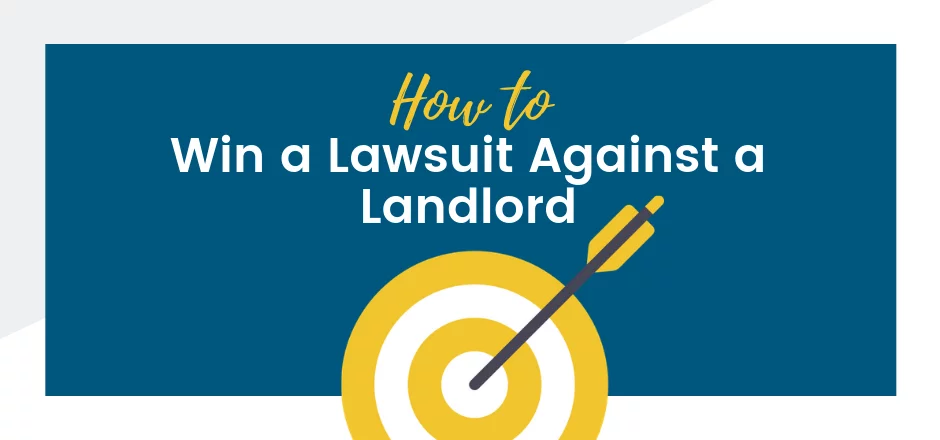How to Win a Lawsuit Against a Landlord
If you find yourself faced with a landlord-tenant dispute in California, you may want to consider your legal options. The law requires landlords to follow a specific procedure relating to a variety of issues, including everything from entering properties to evicting tenants. Understanding the procedure required by law may help you win your case.
Here’s how to win a lawsuit against a landlord.
How to Win a Lawsuit Against a Landlord
Landlord-tenant disputes can be difficult, stressful, and time-consuming, especially in the state of California. Although the California Tenant’s Guidebook does outline exactly how to work through most disputes, sometimes events can occur that leave you, the tenant, suffering from some form of harm.
When you experience damages as a result of a landlord’s inaction or outright negligence, you have the option to sue for compensation in a court of law. Winning your lawsuit, on the other hand, is an entirely different situation.
Today, we’re providing a few tips so you know how to win a lawsuit against a landlord.
What Can You Sue For?
Contrary to popular belief, you cannot sue a landlord for every little grievance. Landlords are required to uphold a certain duty of care, meaning they have to keep the property in good condition and habitable for human use. They also cannot refuse to provide services originally included under your rent without changing your leasing agreement.
This does not, however, include less immediately impactful issues that don’t involve negligence. For example, you cannot sue a landlord for refusing to install a backyard pool or for failing to allow pets onto the property. In these instances, the landlord isn’t negligent – they just provide a different service than you desire.
So what can you sue for?
- Personal injuries as a result of landlord negligence. If a landlord fails to maintain a rental property and you are injured, you can sue your landlord for negligence and recover funds to pay for medical costs, and potentially, pain and suffering.
- Health problems due to poor maintenance. If your landlord fails to address problems that negatively impact the habitability of the property, you may want to consider breaking your lease early, reporting the landlord to the health department, and filing a lawsuit. Such issues may include mold problems, broken air conditioning & heating, and broken water heaters.
- Bed bug infestations, in limited cases. Landlords cannot be held responsible for pest problems unless they fail to address the issue correctly. For example, some landlords will attempt to lower the costs associated with bed bug elimination by treating only one unit at a time. If your unit becomes infested as a result of this practice, you may have a case.
- Obvious conditional dangers: If your roof is leaking to the point that you have water damage, you may be able to sue your landlord for putting you at risk. This may be the case even if you haven’t yet been harmed.
- Any landlord action that breaks the law and/or violates your rental agreement. If the landlord enters your apartment without permission or refuses to provide essential services included in your lease, you may have the right to sue.
Other scenarios may be appropriate for the civil court, too, depending on case specifics. Speak with a lawyer to gain a clearer picture.
Know Your Rights and Responsibilities
Landlords and tenants both have rights and responsibilities as set forth in A California Guide to Residential Tenants’ and Landlords’ Rights and Responsibilities. You should strive to adhere to your responsibilities, and assert your rights, at all times, right from initial move-in until the day you leave.
But what does this have to do with suing?
First of all, it ensures you don’t inadvertently fail to hold up your end of the bargain. If an issue arises that necessitates a lawsuit against the landlord, they won’t be able to claim you failed in your duty to be responsible as an excuse.
If you can prove you knew and followed the tenant’s guide, it may also help you show the courts you tried your best to be a good tenant. This could help you argue against a landlord who attempts to make false claims against you.
Here are your most important responsibilities:
- Keep the premises clean and habitable.
- Don’t damage the property, inside or out.
- If you do cause damage, notify the landlord immediately.
- Pay your rent on time, every time.
- Do not retaliate against your landlord for asserting their rights.
And your most important rights:
- Damage deposits must fall within legal limitations.
- Landlords cannot enter at will, except in emergencies.
- You have the right to sue if a landlord violates the law or your lease.
- You have the right to repair serious issues if the landlord refuses.
- You also have the right to deduct emergency repair costs from the rent.
- You have the right to withhold rent, but only within certain circumstances.
- Your landlord must return your damage deposit or account for spending it.
- Your landlord may not retaliate against you with wrongful eviction.
Above all else, know that being a good tenant is the best way to avoid lawsuits in the first place – but don’t be afraid to assert your rights if it becomes necessary.
Try To Resolve the Problem Directly
If you landed on this page because you’ve only just now experienced an issue with a landlord, know that suing is rarely an appropriate first step (there are, of course, always exceptions to this rule).
You should attempt to work the issue out with the landlord first within reason. For example, if you have a repair issue with your ceiling, ask the landlord to repair it first.
Whenever possible, deliver the request in writing and allow for a reasonable amount of time to correct the issue (e.g., five business days, a week, or two weeks).
If the landlord still refuses to intervene, you can inform the judge of your attempts to resolve the matter out of court. This can be compelling proof that you tried your best to be understanding, which may help you win your case.
Document Everything
Take pictures and keep a log of all conversations. If you have any requests, make them in writing, noting how and when they were delivered to the landlord. You don’t necessarily need to write it out on a piece of paper and hand-deliver it to their office; just be sure there’s a record of the exchange somewhere.
If you have concerns about damage or repair issues, video and photos can be compelling evidence of the problem. Similarly, a sworn affidavit from your physician may help you prove health problems or injuries due to landlord negligence.
Be Respectful – Even If You’re Angry
When a landlord constantly antagonizes you, it can be tempting to throw caution to the wind and bite back with insults or threats. You may even want to trash the apartment and just leave to get them back.
Never engage in this kind of behavior, especially if you think you might need to sue the landlord down the road. Not only can you be held responsible for any damages, or potentially, charged with harassment, but the landlord instantly gains a defense for his refusal to work with you.
Instead, rise above. Be respectful, courteous, and willing to compromise where you can. This is one case where you don’t want to be aggressive.
Contact a Lawyer
Now that you understand how to win a lawsuit against a landlord, you can proceed with confidence. Be sure to evaluate your original lease agreement, read any documentation available that relates to your situation, and consider finding a lawyer who specializes in landlord-tenant disputes in Los Angeles.
It’s important that you speak with a lawyer to strategize about your case. Take the first step today and get on your way to pushing back against bad landlords the right way.
Are you in search for a certified attorney to represent you?
Let us help you find one today!



